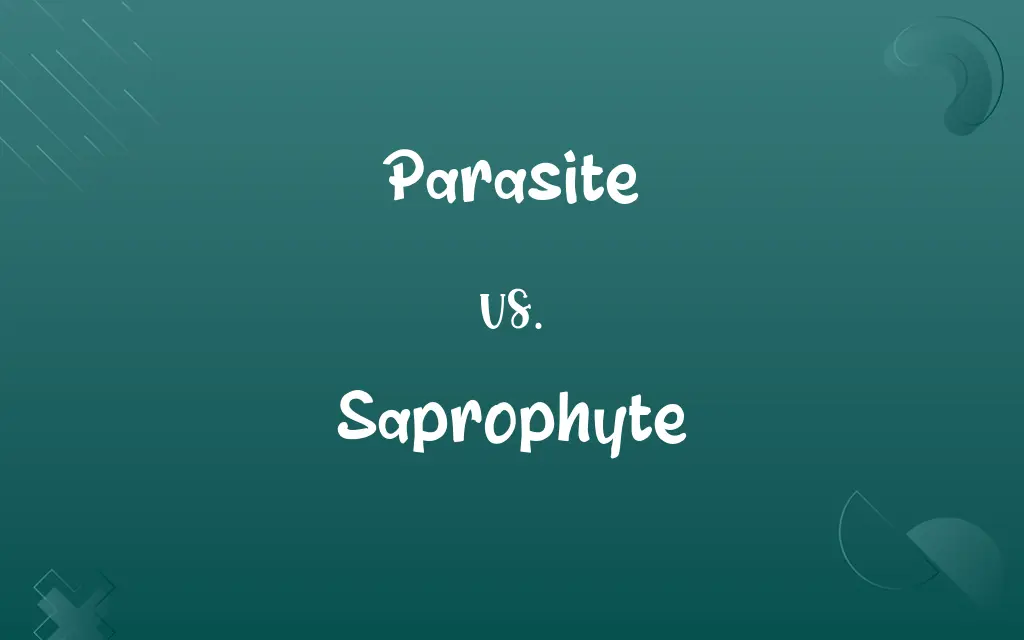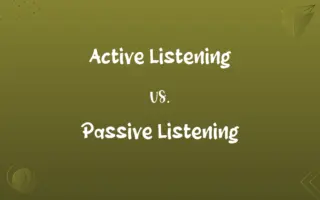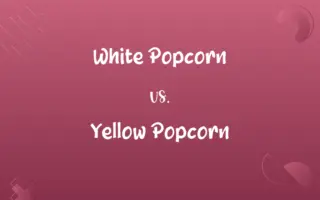Parasite vs. Saprophyte: Know the Difference

By Shumaila Saeed || Published on February 26, 2024
A parasite is an organism that lives on or in a host and gets its food at the host's expense, whereas a saprophyte is an organism that feeds on decomposing organic matter.

Key Differences
A parasite, such as certain bacteria, fungi, or animals, relies on a living host for nourishment, often harming the host. Conversely, a saprophyte, primarily fungi or bacteria, obtains nutrients from dead or decaying organic matter, contributing to decomposition.
Shumaila Saeed
Feb 26, 2024
Parasites engage in a symbiotic relationship where they benefit at the host's expense, potentially causing diseases. Saprophytes play a crucial role in ecosystems by breaking down organic material, thus facilitating nutrient recycling.
Shumaila Saeed
Feb 26, 2024
In terms of ecological impact, parasites can affect the population and health of their hosts, sometimes leading to significant ecological imbalances. Saprophytes, however, are essential for maintaining ecological balance by decomposing dead organisms.
Shumaila Saeed
Feb 26, 2024
Parasitic relationships are found across various species, including plants, animals, and microorganisms. Saprophytes are typically microorganisms like fungi and bacteria that thrive on organic waste and dead matter.
Shumaila Saeed
Feb 26, 2024
The study of parasites, parasitology, focuses on understanding their life cycles, host interactions, and impacts on health. The study of saprophytes involves understanding their role in nutrient cycling and environmental sustainability.
Shumaila Saeed
Feb 26, 2024
ADVERTISEMENT
Comparison Chart
Nutrient Source
Lives on or in a living host
Feeds on decomposing organic matter
Shumaila Saeed
Feb 26, 2024
Relationship with Host
Harmful, symbiotic
Non-symbiotic, contributes to decomposition
Shumaila Saeed
Feb 26, 2024
Ecological Role
Can cause diseases, affect host population
Decomposes matter, recycles nutrients
Shumaila Saeed
Feb 26, 2024
ADVERTISEMENT
Parasite and Saprophyte Definitions
Parasite
Often have complex life cycles dependent on hosts.
The parasite completes its life cycle across different hosts.
Shumaila Saeed
Jan 12, 2024
Saprophyte
Do not harm living organisms.
Saprophytes feed on dead plants without affecting living ones.
Shumaila Saeed
Jan 12, 2024
Parasite
Parasites can harm their hosts.
Malaria parasites cause serious illness in humans.
Shumaila Saeed
Jan 12, 2024
Saprophyte
Some saprophytes produce antibiotics.
Penicillium, a saprophyte, is used to produce penicillin.
Shumaila Saeed
Jan 12, 2024
Parasite
Many parasites are known to cause diseases.
Parasites such as lice can infest and irritate their hosts.
Shumaila Saeed
Jan 12, 2024
ADVERTISEMENT
Saprophyte
Essential for nutrient recycling.
Saprophytic bacteria play a key role in decomposing waste.
Shumaila Saeed
Jan 12, 2024
Parasite
(Biology) An organism that lives and feeds on or in an organism of a different species and causes harm to its host.
Shumaila Saeed
Jan 10, 2024
Saprophyte
Saprophytes break down dead matter.
Mushrooms growing on a log are saprophytes.
Shumaila Saeed
Jan 12, 2024
Parasite
One who habitually takes advantage of the generosity of others without making any useful return.
Shumaila Saeed
Jan 10, 2024
Saprophyte
Improve soil fertility.
Saprophytes in the soil help in breaking down organic matter.
Shumaila Saeed
Jan 12, 2024
Saprophyte
An organism, especially a fungus or bacterium, that derives its nourishment from dead or decaying organic matter. Also called saprobe.
Shumaila Saeed
Jan 10, 2024
Saprophyte
Any organism that lives on dead organic matter, as certain fungi and bacteria
Shumaila Saeed
Jan 10, 2024
Parasite
(pejorative) A person who lives on other people's efforts or expense and gives little or nothing back.
Shumaila Saeed
Jan 10, 2024
Saprophyte
Any plant growing on decayed animal or vegetable matter, as most fungi and some flowering plants with no green color, as the Indian pipe.
Shumaila Saeed
Jan 10, 2024
Saprophyte
An organism that feeds on dead organic matter especially a fungus or bacterium
Shumaila Saeed
Jan 10, 2024
Parasite
(biology) An organism that lives on or in another organism of a different species, deriving benefit from living on or in that other organism, while not contributing towards that other organism sufficiently to cover the cost to that other organism.
Lice, fleas, ticks and mites are widely spread parasites.
Shumaila Saeed
Jan 10, 2024
Parasite
(historical) A retainer or companion of an ancient Celtic warrior, who praised him in song or poetry at gatherings; a bard.
Shumaila Saeed
Jan 10, 2024
Parasite
(aviation) A component of a composite aircraft which is carried aloft and air-launched by a larger carrier aircraft or mother ship to support the primary mission of the carrier.
Shumaila Saeed
Jan 10, 2024
Parasite
One who frequents the tables of the rich, or who lives at another's expense, and earns his welcome by flattery; a hanger-on; a toady; a sycophant.
Thou, with trembling fear,Or like a fawning parasite, obey'st.
Parasites were called such smell-feasts as would seek to be free guests at rich men's tables.
Shumaila Saeed
Jan 10, 2024
Parasite
A plant obtaining nourishment immediately from other plants to which it attaches itself, and whose juices it absorbs; - sometimes, but erroneously, called epiphyte.
Shumaila Saeed
Jan 10, 2024
Parasite
An animal which lives during the whole or part of its existence on or in the body of some other animal, feeding upon its food, blood, or tissues, as lice, tapeworms, etc.
Shumaila Saeed
Jan 10, 2024
Parasite
An animal or plant that lives in or on a host (another animal or plant); the parasite obtains nourishment from the host without benefiting or killing the host
Shumaila Saeed
Jan 10, 2024
Parasite
A follower who hangs around a host (without benefit to the host) in hope of gain or advantage
Shumaila Saeed
Jan 10, 2024
Parasite
A parasite depends on another organism.
A tapeworm is a parasite that lives in the intestines of its host.
Shumaila Saeed
Jan 12, 2024
Parasite
Parasites absorb nutrients from their hosts.
Parasitic plants like mistletoe extract water and nutrients from their host trees.
Shumaila Saeed
Jan 12, 2024
Repeatedly Asked Queries
How do parasites reproduce?
Parasites can reproduce sexually or asexually, depending on the species.
Shumaila Saeed
Feb 26, 2024
How do parasites spread?
They can spread through contaminated water, food, waste, soil, and blood or by vectors like mosquitoes.
Shumaila Saeed
Feb 26, 2024
Can parasites live outside a host?
Some parasites can survive outside a host for a time, but they need a host to complete their life cycle.
Shumaila Saeed
Feb 26, 2024
What are endoparasites?
Endoparasites live inside the host's body, like tapeworms and liver flukes.
Shumaila Saeed
Feb 26, 2024
What is a parasite?
A parasite is an organism that lives on or in a host organism and gets its food at the expense of its host.
Shumaila Saeed
Feb 26, 2024
Can parasites infect humans?
Yes, many parasites, like tapeworms and malaria-causing Plasmodium, can infect humans.
Shumaila Saeed
Feb 26, 2024
What are examples of parasites?
Examples include fleas, ticks, lice, and certain bacteria and viruses.
Shumaila Saeed
Feb 26, 2024
Do saprophytes cause diseases?
Generally, no. Saprophytes are crucial for decomposition and nutrient cycling in ecosystems.
Shumaila Saeed
Feb 26, 2024
How are parasites treated?
Treatment varies and can include medications like antiparasitic drugs.
Shumaila Saeed
Feb 26, 2024
What is a saprophyte?
A saprophyte is an organism that feeds on dead or decaying organic matter, mainly fungi, and certain bacteria.
Shumaila Saeed
Feb 26, 2024
Are all parasites harmful?
Most parasites cause harm to their host, but the degree of harm can vary widely.
Shumaila Saeed
Feb 26, 2024
What are ectoparasites?
Ectoparasites live on the surface of the host, like fleas and lice.
Shumaila Saeed
Feb 26, 2024
How do saprophytes obtain nutrients?
They release enzymes that break down organic matter, absorbing the released nutrients.
Shumaila Saeed
Feb 26, 2024
Are saprophytes photosynthetic?
No, saprophytes do not perform photosynthesis.
Shumaila Saeed
Feb 26, 2024
Can saprophytes grow on living organisms?
Typically, saprophytes grow on dead or decaying matter, not living organisms.
Shumaila Saeed
Feb 26, 2024
How are saprophytes different from parasites?
Saprophytes feed on dead matter, while parasites feed on living hosts.
Shumaila Saeed
Feb 26, 2024
What role do saprophytes play in the environment?
They help in the decomposition of organic matter, recycling nutrients back into the ecosystem.
Shumaila Saeed
Feb 26, 2024
What are some examples of saprophytes?
Examples include the fungi Penicillium and certain bacteria in soil.
Shumaila Saeed
Feb 26, 2024
Do saprophytes need sunlight?
No, they do not require sunlight as they do not perform photosynthesis.
Shumaila Saeed
Feb 26, 2024
Can saprophytes cause food spoilage?
Yes, some saprophytic fungi and bacteria can cause spoilage in food items.
Shumaila Saeed
Feb 26, 2024
Share this page
Link for your blog / website
HTML
Link to share via messenger
About Author
Written by
Shumaila SaeedShumaila Saeed, an expert content creator with 6 years of experience, specializes in distilling complex topics into easily digestible comparisons, shining a light on the nuances that both inform and educate readers with clarity and accuracy.




































































